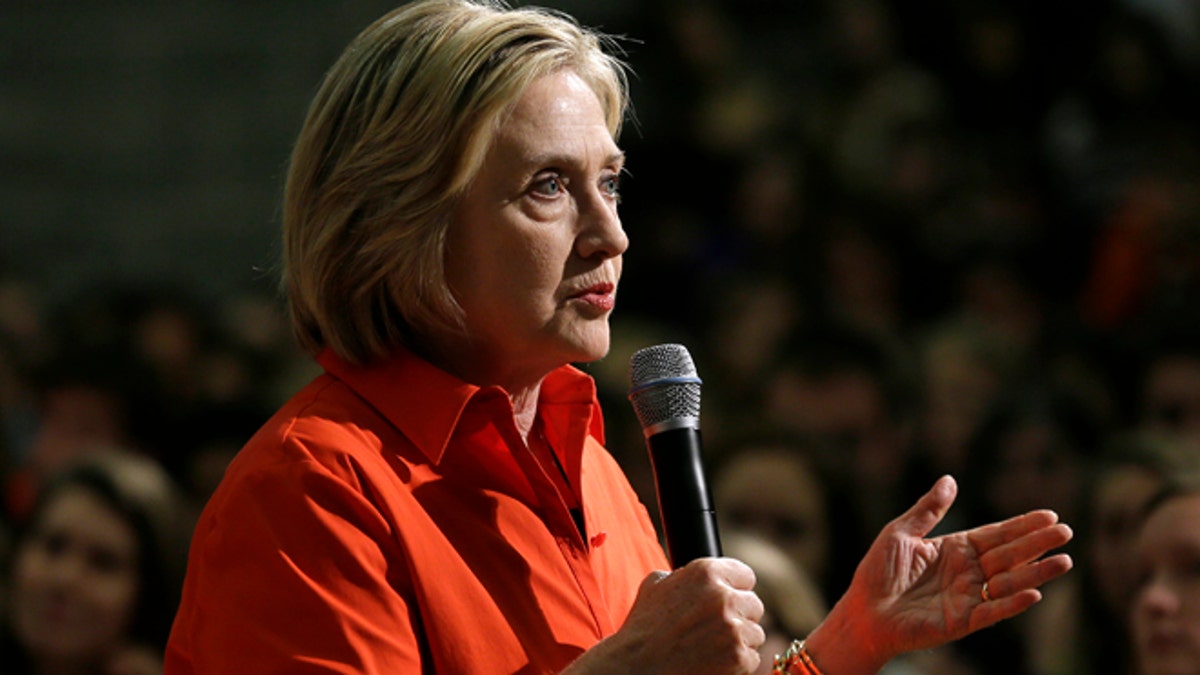
Nov. 3, 2015: Democratic presidential candidate Hillary Rodham Clinton speaks during a town hall meeting at Grinnell College Tuesday in Grinnell, Iowa. (AP)
On January 22nd, 2009, Hillary Clinton signed a Non-Disclosure agreement, or NDA, where she agreed to protect highly classified information, and a failure to do so could result in criminal prosecution.
"I have been advised that any breach of this Agreement may result in my termination of my access to SCI (Sensitive Compartmented Information) and removal from a position of special confidence," the NDA reads.
"I have been advised that any authorized disclosure of SCI by me may constitute violations of United States criminal laws, including provisions of Sections 793, 794, 798 and 952, Title 18 United States Code..." These are provisions of the Espionage Act, and as Fox recently reported, 18 USC 793 subsection (f) is of special interest to the FBI investigation as it includes "gross negligence" in the handling of national defense information.
The NDA was first obtained through a federal lawsuit under the Freedom of Information Act by the Competitive Enterprise Institute, or CEI, which says on its website that it is a "...non-profit public policy organization dedicated to advancing the principles of limited government, free enterprise, and individual liberty."
The NDA signed by Mrs. Clinton as Secretary of State is significant because the State Department has never publicly acknowledged that she signed documents, confirming she was "advised that the unauthorized disclosure, unauthorized retention, or negligent handling" of top secret material was a punishable offense.
The use of a private server for government business, on its face, is a clear violation of the NDA agreement.
The NDA goes on to say -- "I have been advised that the unauthorized disclosure, unauthorized retention, or negligent handling of SCI by me could cause irreparable injury to the United States or be used to advantage by foreign nationals."
This summer the intelligence community's inspector general or ICIG reviewed a random sample from Clinton's server used for government business. The rules are straight forward: the agencies that obtain the intelligence have final say on classification matters, and the affected agencies confirmed to the ICIG that four emails contained classified information that did not originate with the State Department. Two of the emails contained Top Secret/SCI material -- the most highly classified. "Sensitive Compartmented" material has limited access, and requires security clearance holders to sign additional paper work, "to be read in, and off" the project. This second NDA is designed to reinforce how important it is to protect the information as well as sources and methods.
On Friday, based on anonymous sourcing, Politico reported that "the U.S. intelligence community has retreated from claims that two emails in Hillary Clinton’s private account contained top-secret information,"
A spokeswoman for the ICIG, Andrea. G. Williams, told Fox the classification had not changed, and no formal notification had been received by her office. The State Department requested a second review of the emails by the Office of the Director of National Intelligence who oversees the 17 agencies. A statement was expected Friday from the ODNI, that no such determination had been made and the review was ongoing.
The Clinton campaign seemed quick to seize on the Politico report, in light of the now public NDAs. A second NDA for classified information, not specific to special programs, signed by Mrs. Clinton also became public.
Clinton aides had countered the NDA by referring to the Politico report.
The NDAs played a significant role in the prosecution of former CIA Director David Petraeus for wrongly providing highly classified information to his mistress and biographer Paula Broadwell. Petraeus, like Clinton, signed NDAs and a statement of fact filed in his case with the federal court stated that his "criminal conduct" was based on violations of the NDAs signed with the Defense Department and CIA.












































